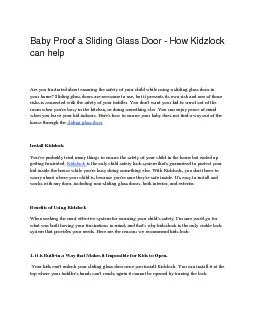PPT-How to help your child cope
Author : pamella-moone | Published Date : 2019-11-08
How to help your child cope w ith stress and anxiety KidsHealthcom Poll When asked about stress kids said that they were stressed out the most by grades school and
Presentation Embed Code
Download Presentation
Download Presentation The PPT/PDF document "How to help your child cope" is the property of its rightful owner. Permission is granted to download and print the materials on this website for personal, non-commercial use only, and to display it on your personal computer provided you do not modify the materials and that you retain all copyright notices contained in the materials. By downloading content from our website, you accept the terms of this agreement.
How to help your child cope: Transcript
Download Rules Of Document
"How to help your child cope"The content belongs to its owner. You may download and print it for personal use, without modification, and keep all copyright notices. By downloading, you agree to these terms.
Related Documents














